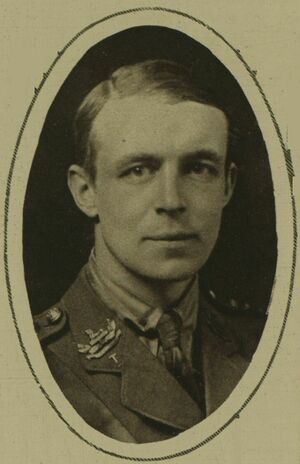Colin Coote
(journalist, editor, politician, spook) | ||||||||||||||||||||||||||||||||||||
|---|---|---|---|---|---|---|---|---|---|---|---|---|---|---|---|---|---|---|---|---|---|---|---|---|---|---|---|---|---|---|---|---|---|---|---|---|
 | ||||||||||||||||||||||||||||||||||||
| Born | 19 October 1893 | |||||||||||||||||||||||||||||||||||
| Died | 8 June 1979 (Age 85) | |||||||||||||||||||||||||||||||||||
| Alma mater | Rugby School, Balliol College (Oxford) | |||||||||||||||||||||||||||||||||||
| Party | Liberal Party (UK) | |||||||||||||||||||||||||||||||||||
Editor of The Daily Telegraph with close ties to the intelligence services.
| ||||||||||||||||||||||||||||||||||||
Sir Colin Reith Coote was a British journalist and Liberal politician. For fourteen years he was the editor of The Daily Telegraph.[1] In the 1920s and 1930s he was based in Rome as a correspondent for The Times where he was also part of a spy network established by Desmond Morton of MI6.[2]
Early life
He was born in Fenstanton, Huntingdonshire. He was the son of Howard Browning Coote of Stukeley Hall, later Lord Lieutenant of Huntingdonshire, and Jean Coote (née Gray) of Aberdeen.[3] He was educated at Rugby School and Balliol College, Oxford, graduating in 1914.[1][3][4] On the outbreak of the First World War, he obtained a commission in the Gloucestershire Regiment.[3] He was in France and Italy, and was forced to return to the United Kingdom, having been wounded and gassed. He was awarded the Distinguished Service Order in 1918.[1]
Early career
In November 1917, the sitting Liberal Member of Parliament for Wisbech, Neil James Archibald Primrose, was killed in action. Coote was chosen as the Liberal candidate for the seat, and, due to a war-time pact between the two parties, was also nominated by the local Conservative and Unionist Association.[5] He was returned unopposed to the House of Commons on 14 December 1917.[1][3]
A general election was held in 1918. Constituencies were completely reorganised by the Representation of the People Act 1918, and the Wisbech seat became part of the new Isle of Ely division. Coote was elected as MP for the Isle of Ely, again unopposed.[3][4]
At the subsequent general election in 1922 his differences with the Conservatives saw them running a candidate against him. Coote, running as a National Liberal, was defeated by Colonel Norman Coates. With hindsight, Coote described his defeat as the "crowning mercy" of his career, as it allowed him to pursue journalism.[1]
Whilst a Member of Parliament, Coote had gained a reputation as a freelance writer. On leaving the Commons, he was appointed Rome correspondent of The Times.[1] His period in Italy saw him covering the rise of Italian Fascism under Benito Mussolini.[1][3] Returning to the UK in 1926, he spent three years as a parliamentary reporter before becoming a leader writer.[1][3]
Later career
By the time of the Munich Crisis, Coote found himself opposed to the newspaper's support of appeasement, and refused to write leaders supporting the policy.[1][3] He finally left The Times in 1942 on the resignation of Geoffrey Dawson as editor.[1], and became head of the Public Relations department at the War Office.[2]
He became deputy editor of the Telegraph in 1945, and succeeded Arthur Watson as editor in 1950.[1] He held the post until 1964, with his Liberal tendencies balancing the otherwise Conservative views of the paper.[1]
In 1961, Coote introduced osteopath Stephen Ward to Soviet diplomat Eugene Ivanov, a meeting that would lead to the Profumo affair.[6] [7]
Coote remained in contact with the British intelligence services and was a close friend and golfing partner of Roger Hollis, the Director-General of MI5. He was knighted in 1962.[1][3]
In April 1964 Colin Coote left his post as editor of the Daily Telegraph. Soon afterwards he was involved in another scandal. Later that year he was on holiday with Lord Boothby when on 12 July 1964, the Sunday Mirror published a front page lead story under the headline: "Peer and a gangster: Yard probe." The newspaper claimed police were investigating an alleged homosexual relationship between a "prominent peer and a leading thug in the London underworld". Rumours soon began circulating that the peer was Boothby and the gangster was Ronnie Kray.[2]
Coote died at his London home on 8 June 1979, aged 85.[1][3]
Family
Coote married three times. In 1916, he married Marguerite Doris Wellstead, of Hessle, East Riding of Yorkshire and they had two daughters before divorcing in 1925. He subsequently married Denise Dethoor, of Doulieu, France. She died in 1945, and he married Amalie Lewkowitz in the following year.[3]
References
- ↑ a b c d e f g h i j k l m n Obituary: Sir Colin Coote - Politics from the editor's chair". The Times. 23 November 1979. p. VI.
- ↑ a b c Spartacus Educational https://spartacus-educational.com/SPYcoote.htm
- ↑ a b c d e f g h i j k http://www.oxforddnb.com/view/article/30967
- ↑ a b "General Election, 1918- Unopposed Returns". The Times. 5 December 1918. p. 14.
- ↑ "The Wisbech Vacancy". The Times. 8 December 1917. p. 5.
- ↑ Honeytrap by Anthony Summers & Stephen Dorril, Coronet Books, 1987. P.108.)
- ↑ https://www.thegazette.co.uk/London/issue/42599/page/1285